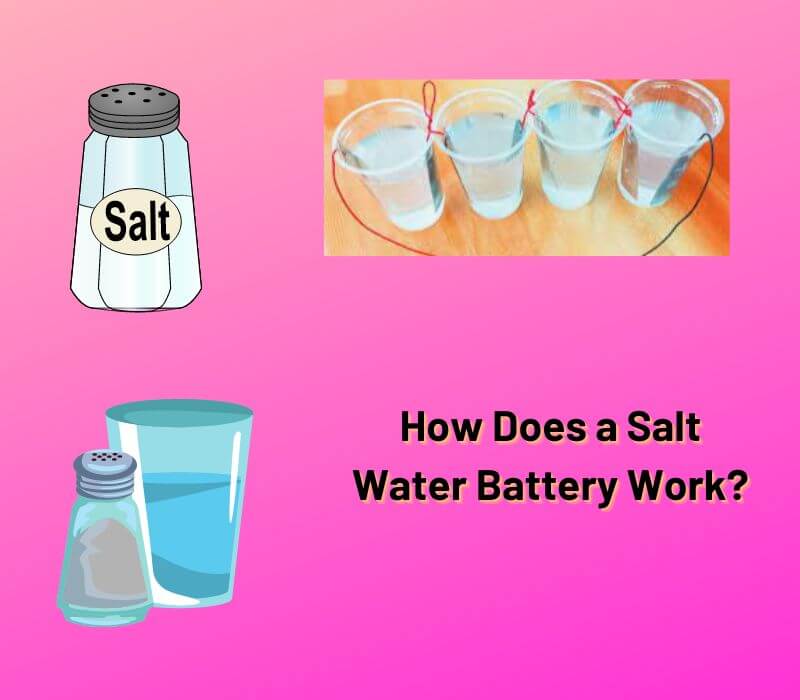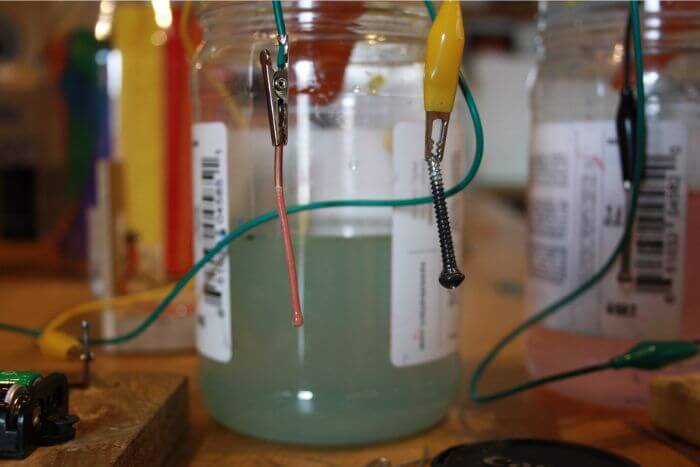Can Salt Power a Battery? (How Does a Salt Water Battery Work?)
Did you know that salt can be used to power a battery? It’s true!
This process is called an electrochemical reaction.
If you’re looking for a way to power your battery without using traditional methods, you may be wondering if salt can do the trick. While it’s not exactly a common method, it is possible to use salt to power a battery. Here’s how it works:
The process of using salt to power a battery is actually pretty simple. All you need is a container of saline solution (salt water), some electrodes, and something to connect the electrodes to the battery terminals. When you hook everything up, the salt water will start conducting electricity and will charge up the battery.
Of course, this method is not without its drawbacks. For one thing, it’s not very efficient – you’ll only be able to get a small amount of charge into the battery this way. Additionally, there’s always the risk of spillage when using salt water indoors.
However, if you’re in a pinch and need a quick boost for your dead battery, this method could definitely work in a pinch!
12 Volt Salt Water Battery
The 12-volt saltwater battery is a new type of battery that uses salt water to create electricity. This battery is environmentally friendly and has the potential to revolutionize the way we power our homes and businesses. Here’s everything you need to know about this amazing new technology.
How it works: Traditional batteries rely on a chemical reaction between two metals, typically lead and acid, to generate electricity. The 12-volt saltwater battery uses a different process called electrolysis to generate electricity from salt water.
In electrolysis, an electric current is used to break down water molecules into hydrogen and oxygen gas. These gases are then recombined inside the battery to create electrical energy in electrolysis.
| Advantages | Explanation |
| 1. Environmentally friendly | Unlike traditional batteries that contain toxic chemicals, the 12-volt salt water battery is completely safe for the environment. |
| 2. Long lasting | The 12-volt saltwater battery can last for up to 10 years with proper maintenance. |
| 3. Powerful | The 12-volt saltwater battery can generate enough power to run small appliances and even lights! |
| 4. Affordable | The12 volt salt water battery is very affordable compared to traditional batteries, making it a great option for those on a budget. |
How Does a Salt Water Battery Work?
A salt water battery is a type of battery that uses salt water as an electrolyte. The chemical reaction between the salt water and the metals in the battery produces an electrical current that can be used to power devices. Salt water batteries are environmentally friendly, as they do not use toxic chemicals or require rare materials.
They are also long-lasting, as they do not suffer from corrosion like other types of batteries.

Salt Water Battery Disadvantages
One of the main disadvantages of salt water batteries is their high cost. They are significantly more expensive than lead-acid batteries, for example. This high cost limits their use to large-scale applications and industrial settings where they can be justified.
Another disadvantage of salt water batteries is that they require careful maintenance and regular servicing in order to function properly and avoid corrosion. This can add significant operational costs and reduce the overall efficiency of the system. Finally, salt water batteries are not as widely available as other types of batteries, making them less accessible to many potential users.
This limited availability may change in the future as the technology continues to develop, but for now it remains a key drawback.
Salt water Battery
When it comes to batteries, there are a lot of different types and technologies out there. But two of the most popular battery types are saltwater batteries and lithium-ion batteries. So, which one is better?
Saltwater batteries are a newer technology that is based on electrolyte solutions made from water and salt. These batteries have a number of advantages over traditional lead-acid batteries, including:
| They’re safer | Saltwater batteries don’t use any corrosive or toxic chemicals, making them much safer than other types of batteries. |
| They’re cheaper | Saltwater electrolytes are cheaper to produce than the chemicals used in traditional lead-acid batteries. This means that saltwater batteries can be produced at a lower cost. |
| They last longer | Saltwater batteries tend to have a longer lifespan than traditional lead-acid batteries due to their lack of corrosive chemicals. |
Salt Water Battery DIY
Are you looking for a way to store energy from the sun and wind? If so, you may be interested in building your own salt water battery. Salt water batteries are environmentally friendly and have a long lifespan.
Plus, they’re relatively easy to build! In this blog post, we’ll show you how to make your own salt water battery at home. First, let’s talk about how salt water batteries work.
These batteries use an electrolyte solution of sodium chloride (salt water) and distilled water. When the sun or wind hits the solar panels or wind turbine, it produces DC electricity. This DC electricity is then used to split the water molecules into hydrogen and oxygen gas.
The hydrogen gas is stored in a fuel cell, and the oxygen gas is released into the atmosphere. When you need to use the energy stored in the battery, the process is reversed. The fuel cell combines hydrogen gas with oxygen from the air to produce electricity, which can then be used to power your home or business.
Now that you know how salt water batteries work, let’s get started on building your own! Here’s what you’ll need:
- A container (we recommend using a food-grade plastic bucket);
- Saltwater;
- Distilled water;
- Solar panels or a wind turbine;
- A charge controller;
- An inverter;
- Wiring;
- A fuel cell;
Start by mixing together equal parts of saltwater and distilled water in your container. Next, connect your solar panels or wind turbine to your charge controller using a wiring. Then connect your charge controller to your inverter using more wiring.
Finally, connect your inverter to your container of saltwater using yet more wiring. That’s it – you’ve now built yourself a working salt water battery!
Salt Water Battery Experiment
If you’re looking for a fun and easy science experiment, look no further than the salt water battery experiment! This simple project is perfect for kids of all ages and can be completed in just a few minutes. Here’s what you’ll need:
- A glass or jar;
- Water;
- Salt;
- Paperclips or other metal objects that can serve as electrodes (copper pennies work great!)
Large Salt Water Battery
When it comes to energy storage, one technology that is starting to gain traction is the salt water battery. Salt water batteries are a type of flow battery, which means that they store energy in liquid form. The electrolyte solution used in salt water batteries is made up of saline (salt) water, which gives them their name.
One advantage of salt water batteries is that they are non-flammable and non-explosive, making them much safer than other types of batteries such as lithium-ion batteries. They also have a very long lifespan – upwards of 20 years – and can be discharged and recharged an unlimited number of times without degrading. Another advantage of salt water batteries is that they are scalable; you can add more electrolyte solutions to increase the capacity of the battery, or build multiple units to create a larger system.
And because the electrolyte solution is relatively inexpensive, salt water batteries can be a cost-effective option for energy storage. If you’re looking for a safe, long-lasting, and scalable energy storage option, salt water batteries may be worth considering.

FAQs
Can Salt Water Power a Battery?
Sure! Salt water can absolutely power a battery. In fact, salt water is already being used to power batteries in some experimental devices.
Here’s how it works: Salt water is composed of positive and negative ions. When these ions flow through a special type of membrane, they create an electrical current.
This current can then be harnessed to power a battery. The big advantage of using salt water to power a battery is that it’s an environmentally friendly option. There are no harmful emissions associated with this method of generating electricity.
Plus, salt water is abundant and easily renewable – making it a very attractive option for powering batteries in the future.
What Does Salt Do to a Battery?
When it comes to batteries, salt can be both good and bad. In small amounts, salt can actually help improve battery performance. This is because salt helps to conduct electricity and increases the overall efficiency of the battery.
However, too much salt can have the opposite effect and actually damage the battery. This is because salt causes corrosion which can lead to electrical shorts and ultimately reduce the lifespan of the battery.
How Efficient are Salt Batteries?
There are many different types of batteries, each with its own advantages and disadvantages. One type of battery that has been gaining popularity in recent years is the salt battery. Salt batteries are claimed to be more efficient than traditional lead-acid batteries, making them a good choice for use in renewable energy systems.
But how efficient are they really? To answer this question, we need to first understand how salt batteries work. Salt batteries work by using a process called electrolysis to convert chemical energy into electrical energy.
In a salt battery, two electrodes are placed in a solution of water and salt. When an electric current is applied to the electrodes, the water molecules break down into hydrogen and oxygen gas. The hydrogen gas is then used to power a fuel cell which produces electricity.
| The main advantage of salt batteries | The main advantage of salt batteries is that they can be easily recharged by simply adding more salt to the solution. This makes them very well suited for use in renewable energy systems where the power source (e.g., solar or wind) is intermittent and unpredictable. |
| Another advantage of salt batteries | Another advantage of salt batteries is that they have a long lifespan – up to 20 years or more – making them much cheaper in the long run than traditional lead-acid batteries. |
So, how efficient are salt batteries? In terms of electrical efficiency, salt batteries are about 80% efficient, meaning that 80% of the chemical energy stored in the battery is converted into usable electrical energy. This is slightly higher than the efficiency of lead-acid batteries, which typically range from 50-75%.
However, it should be noted that lead-acid batteries typically have a higher discharge rate than salt batteries meaning you’ll get more usable power out over time..
Does Salt Increase Voltage?
No, salt does not increase voltage. Salt is an electrolyte and can conduct electricity, but it does not increase the voltage of an electrical circuit.
Conclusion
Salt is a good conductor of electricity and can be used to create a battery that is similar to the ones found in commercial products. The author provides instructions on how to make a salt-powered battery, as well as how to use it.
Used Resources:
